Mark Fuller Dillon's Blog, page 16
August 21, 2020
Five Major Divisions In Science Fiction
From
"The Guest of Honor Speech at the 31st World Science Fiction Convention, August 31, 1973," by Robert Bloch.
The Alien Critic, Number Ten, August 1974.
Focus On The Good
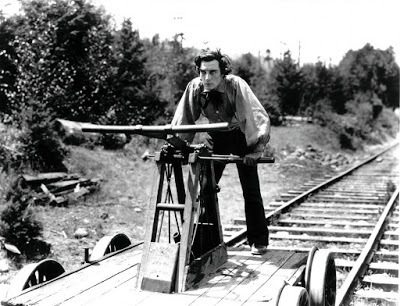
I've noticed on Youtube a looming trend of people who not only criticize corporate "pop" culture, but have grown to hate it. I know this feeling, because I reached that point in the 1970s, and promised myself that I would never own a TV set. I never have.
Still, I would urge these people to keep something else in mind: tearing apart lousy films and TV shows might reveal to us details of technique and of our unconfronted needs as humans, but eventually, we have to face our needs; we have to find things we can support as alternatives to corporate crap.
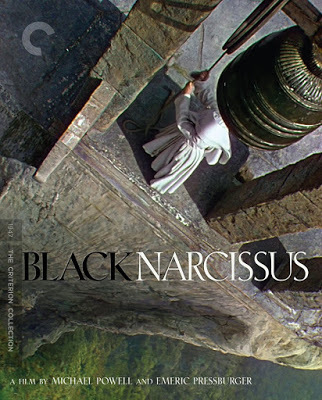
To these people I would say -- Turn off the TV set. Forget these modern films. World cinema has been with us for more than a century, and we have piles of treasure waiting for attention. Not only films: take a leap into the long history of art and fiction, poems and plays, essays and comic strips, paintings and symphonies.
Why focus on the new, when you could focus instead on the good?
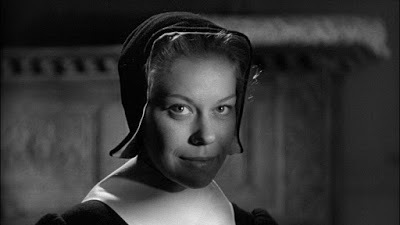
Crow Beer
Jason E. Rolfe has tried a beer called Murder of Crows. He wrote, "It tastes like somebody actually murdered a crow and then stuffed it into this can."
His comment inspired me... sort of.
Crow Beer, Crow Beer:
Carrion, canned and creamed!
I'll take no beer
Over this one I've deemed
A beakful of birdhouse blather,
With hints of equine lather.
One sip of you
Has blocked my view
Of the lifetime for which I schemed!
Serious Massage
-- From the Spam box, Tuesday, August 18.
Repetitions Of The Red Brain
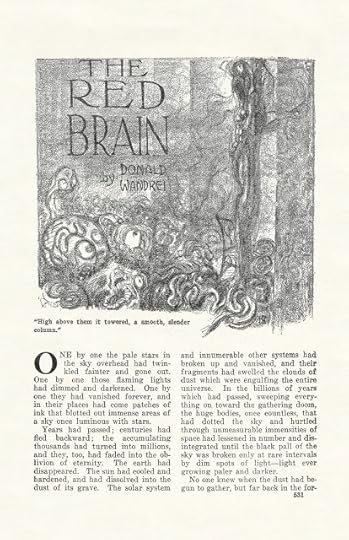 WEIRD TALES, October 1927. Illustration by Hugh Rankin. Click for larger view.
WEIRD TALES, October 1927. Illustration by Hugh Rankin. Click for larger view.Because Donald Wandrei was only sixteen years old when he wrote "The Red Brain," a gentler person might look away from its prose. Being as gentle as a hornet, I wish the editor had taken Wandrei aside and shown him that a story can only repeat its opening information so many times before the reader wants to hurl that pile of echoing paper into the woodstove.
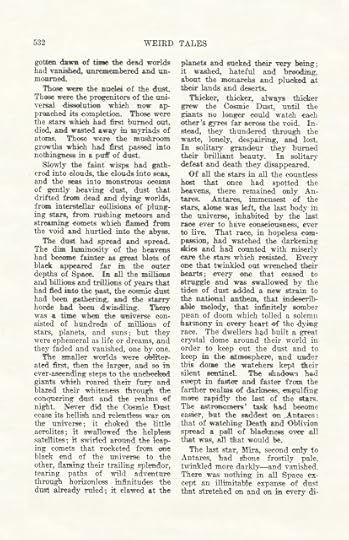 Repeat, repeat, repeat until the reader screams.
Repeat, repeat, repeat until the reader screams.
Once the story has limped beyond the first two pages, it does reveal an interesting core. Wandrei has combined the "dying universe" concept explored by previous writers like George Sterling and Leconte de Lisle with a mood similar to "The Masque of the Red Death." I can excuse Wandrei's inability to handle the concept with the poetic skill of Sterling (in "The Testimony of the Suns") or of de Lisle (in "L'Astre Rouge, "La Joie de Siva," "Solvet Saeclum," "La Dernière vision"); very few of us can write so well. The concept remains a good one.
But is a concept enough to save a story? No. Style and structure matter, because these are the only tools a writer has to convey a concept with economy, clarity, and force. With its rhetorical style and repetitive structure, "The Red Brain" is a could-have-been story: it could have been good, if someone had shown the writer better ways to handle his ideas. *
* We know from his article in the Overland Monthly (December, 1926) that Wandrei admired Clark Ashton Smith's poetry, but I have no idea of how much Wandrei knew at the time about Smith's fiction. Smith had a better grasp of prose and structure than anything shown here. One of Smith's many virtues is that he allowed his short stories to move: he could integrate exposition, physical description, and settings in ways that put the reader inside the stories, as a participant. Wandrei does not approach that level in "The Red Brain."
His Nature Is Too Noble For The World: Coriolanus
For one thing, the play moves. It hits the opening act at full speed, and then rarely slows down.
FIRST CITIZEN:
You are all resolved rather to die than to famish?
ALL:
Resolved, resolved.
FIRST CITIZEN:
First, you know Caius Marcius is chief enemy to the people.
ALL:
We know't, we know't.
FIRST CITIZEN:
Let us kill him, and we'll have corn at our own price. Is't a verdict?
ALL:
No more talking on't! let it be done! Away, away!
For another, the language has a bare, stripped-down vitality, mostly free of the rhetoric that delights, confounds, and polarizes readers of the other plays.
MENENIUS:
I'll leave you. Pray you, speak to 'em, I pray you,
In wholesome manner.
Exit.
CORIOLANUS:
Bid them wash their faces
And keep their teeth clean.
Finally, the play avoids long soliloquies that reveal the minds of characters. In Act II, Scene 3, we are given a glimpse into the head of Coriolanus, but the narrative camera pulls back immediately.
CORIOLANUS:
Better it is to die, better to starve,
Than crave the hire which first we do deserve.
Why in this wolvish toge should I stand here,
To beg of Hob and Dick that does appear,
Their needless vouches? Custom calls me to't.
What custom wills, in all things should we do't,
The dust on antique time would lie unswept,
And mountainous error be too highly heapt
For truth t' o'erpeer. Rather than fool it so,
Let the high office and the honour go
To one that would do thus.
This lack of introspection gives the play a mood of stark political conflict, with scenes of confrontation as dramatic and troubling as any by Shakespeare. The world revealed is one we know, where managed perception counts for more than fact, where alliances twist and shift without warning and without consequences to betrayers, where politicians cloak themselves in public service while endangering the public. Above all, this is a world of resentment, in which someone misunderstood by the crowd comes to seem a threat to shun instead of a hero to emulate.
The play adds discomfort by presenting a hero born to be misunderstood. Coriolanus, a soldier first, a politician never, inspires fear in both invading enemies and in his fellow citizens. He is clearly a patriot, clearly a defender of the city, but what, at heart, does a city represent?
SICINIUS:
What is the city but the people?
ALL [PLEBEIANS]:
True,
The people are the city.
Or might a city be something more: an ideal, a principle beyond the power of its people to grasp?
FOURTH CITIZEN:
You have deserved nobly of your country, and you have not deserved nobly.
CORIOLANUS:
Your enigma?
FOURTH CITIZEN:
You have been a scourge to her enemies; you have been a rod to her friends. You have not indeed loved the common people.
CORIOLANUS:
You should account me the more virtuous that I have not been common in my love.
To every public task, Coriolanus brings a blunt candour, but honesty has never been a popular virtue.
SECOND OFFICER:
Faith, there hath been many great men that have flattered the people, who ne'er loved them; and there be many that they have loved, they know not wherefore; so that, if they love they know not why, they hate upon no better a ground. Therefore, for Coriolanus neither to care whether they love or hate him manifests the true knowledge he has in their disposition, and out of his noble carelessness lets them plainly see't.
[...]
MENENIUS:
He loves your people;
But tie him not to be their bedfellow.
For Coriolanus, deeds of courage, and service to the state, are what matter.
FIRST SENATOR:
Sit, Coriolanus. Never shame to hear
What you have nobly done.
CORIOLANUS:
Your honor's pardon.
I had rather have my wounds to heal again
Than hear say how I got them.
BRUTUS:
Sir, I hope
My words disbenched you not.
CORIOLANUS:
No, sir. Yet oft,
When blows have made me stay, I fled from words.
You soothed not, therefore hurt not: but your people,
I love them as they weigh --
MENENIUS:
Pray now, sit down.
CORIOLANUS:
I had rather have one scratch my head i' th' sun
When the alarum were struck than idly sit
To hear my nothings monstered.
[...]
FIRST SENATOR:
He cannot but with measure fit the honors
Which we devise him.
COMINIUS:
Our spoils he kicked at,
And looked upon things precious as they were
The common muck of the world. He covets less
Than misery itself would give; rewards
His deeds with doing them; and is content
To spend the time to end it.
[...]
CORIOLANUS:
To brag unto them, 'Thus I did, and thus!'
Show them th' unaching scars which I should hide,
As if I had received them for the hire
Of their breath only!
This is neither innate modesty nor false humility, but the perspective of a man who fights to protect, and not to be paraded afterwards. In Coriolanus, this fighting courage is linked with an honest anger that works on the battlefield, but not in public office.
FIRST SENATOR:
No more words, we beseech you.
CORIOLANUS:
How? no more?
As for my country I have shed my blood,
Not fearing outward force, so shall my lungs
Coin words till their decay against those measles
Which we disdain should tetter us, yet sought
The very way to catch them.
The play strongly implies that this anger is justified; that this unclouded honesty and clarity of principle are noble.
PATRICIAN:
This man has marred his fortune.
MENENIUS:
His nature is too noble for the world.
He would not flatter Neptune for his trident,
Or Jove for's power to thunder. His heart's his mouth.
What his breast forges, that his tongue must vent;
And, being angry, does forget that ever
He heard the name of death.
As the play builds to a climax, it never denies this nobility of honest perception, but, in the speech delivered by the mother of Coriolanus (a moment as fine as anything else in Shakespeare), the play adds a further possibility: not a refutation of what has been done and said, but an extension of noble character that remains true to itself while confronting the public world beyond the self.
In the end, the play asserts the value of a noble gesture, even if that gesture leads to personal destruction. Life might offer no rewards to goodness, but somehow, in human terms, goodness matters to life.
SICINIUS:
Is't possible that so short a time can alter the condition of a man?
MENENIUS:
There is differency between a grub and a butterfly; yet your butterfly was a grub. This Marcius is grown from man to dragon. He has wings; he's more than a creeping thing.
- - - - - - - - - - - - - - - - - - - - - -
Coriolanus will not let me go: the more I think about the play, the more I realize how much more there is to consider.
One detail in particular fascinates me: despite all of the craft and passion clearly on display, Coriolanus has never been popular, and I have read many comments about the main character's being "unsympathetic," "unlikeable." The play undeniably shows a bitter man, but also implies that he has good reason for bitterness.
I suspect, however, that the play's lack of popularity owes more to its message.
By the end of the play, Coriolanus has chosen the path of personal vengeance, and the result will be a massacre. Just before he strikes the first blow, someone close to him appeals to his innate nobility, and suggests a high-minded option that he had not considered. Because the play has made clear that he is a great man, with a nature "too noble for the world," Coriolanus agrees to change his mind and to do the right thing. This is profoundly moving, but it leads to his being stabbed in the back by people who cannot see his virtue.
In short, Coriolanus is punished for being greater than the people around him, and for showing a generosity of spirit that most other characters in the play not only cannot match, but cannot comprehend. He lives misunderstood, he dies misunderstood, and the play suggests that he is misunderstood because of the very qualities that made him great.
From any writer, this would seem a bleak message; from a writer of skill and power like Shakespeare, it becomes overwhelmingly bleak. Yet the implication seems clear: this can be the fate of noble and great figures, because we, the people who misunderstand them and misinterpret their actions, are not, ourselves, noble and great. Between them and us there is a gap of recognition, and we are the ones who are blind.
Limited Range
Nowadays, I respond to anything I read with only two reactions: I seethe quietly with medusan hatred, or I jump around like a sugar-dosed kid in the back seat of a car.
This can't be healthy!
July 13, 2020
Not Quite There But Close, Close
To a young couple at the grocery store yesterday:
A mask that leaves the nose and mouth uncovered will not protect you from COVID-19, but you guys are totally prepared for any virus that attacks the human chin.
May 18, 2020
Madness While Our Time Runs Out
What I do mind is that people often disregard what is posted, but then argue, instead, against their own projected statements.
Like this:
PERSON ONE: A, A, A. Definitely and clearly A.
PERSON TWO: So what you're saying, then, is B.
And so on.
I wonder, too, how many people misread fiction in the same ways that they misread comments on the Web -- and not only fiction. Back in the days when Internet Movie Data Base included discussions, I often suspected that people had in mind films that played more in their heads than on the screen.
Yes, there will always be variations in how we interpret any work of narrative (and certain stories thrive on ambiguity) but is it too much to ask for people to interpret what is actually there on the screen or in the prose?
Another way to look at this (I call it the Shakespeare way, but many writers and artists follow it), is to recognize that most people live in their own heads, perceive only what they want to see, project the inside of their skulls onto everything and everyone around them; to recognize all of this and to not grieve, but, instead, to revel in the spectrum of our human variety, inanity, insanity. Education is a myth, correction is impossible, self-awareness remains a struggle even for the best of us, and so why not salute the madness while our time runs out?
I wish I could.
March 22, 2020
What Do We Mean By Difficult?
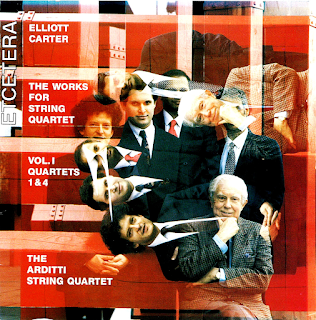
Because musicians and students must analyze music, their perspective on the difficulty of a work is often different from the perspective of someone, like me, who listens for the mere pleasure of sound. For example, decades ago, I read that Webern's work was notoriously difficult, but when I sat down to hear it, I found the music accessible, compelling, haunting in its beauty. Of course, that ease of hearing was the result of hard playing by the musicians.
In a similar way, after having read of how difficult Elliott Carter's quartets can be to perform, I heard last night the Arditti Quartet play Carter's Quartet No. 1, and found the music accessible, enjoyable, beautiful. Right away, I heard the piece again, and again found it no more difficult than, say, the quartets of Bartok or Ligeti.
For those of us freed from the task of mastering a piece of music, hearing it can be an uncomplicated pleasure, and one that we owe to dedicated performers. I wish this idea were common, because I often suspect that many casual listeners avoid modern music (the music of a century ago!) because they have heard of how challenging it can be. And it often is a challenge -- to performers. To the rest of us, the task is often easier; all we need to do is to listen.



